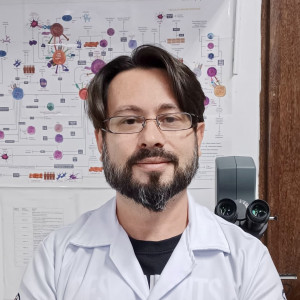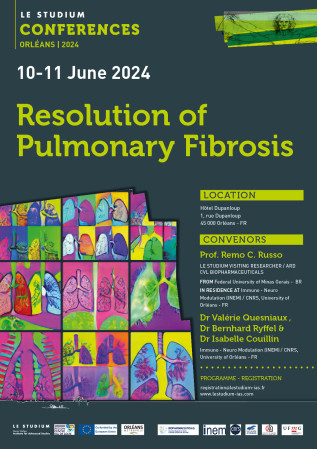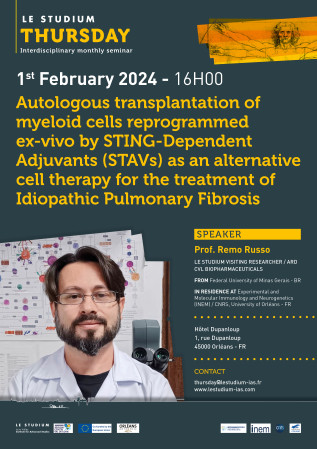Remo Russo

From
Federal University of Minas Gerais - BR
In residence at
Immuno - Neuro Modulation (INEM) / CNRS, University of Orléans - FR
Host scientist
Valérie Quesniaux
BIOGRAPHY
Remo Russo, a biologist with a high degree in immunology, 17 years of experience in immunopharmacology, with a strong background during PhD in immunology studying several aspects of pulmonary diseases, such as Th2 and fibrogenic diseases like (chronic pulmonary inflammation and tissue repair), pharmacological mechanisms and regulation. Currently, is an Associate Professor and head of the Laboratory of Pulmonary Immunology and Mechanics at the Department of Physiology and Biophysics from the Institute of Biological Sciences, Federal University of Minas Gerais/UFMG (Belo Horizonte – Brazil) since 2011. Specific expertise in animal models of pulmonary diseases such as pulmonary fibrosis, asthma, Influenza H1N1 infection, Aspergillosis, Acute Lung Injury, silicosis, lung metastasis of mammary tumors, and pleurisy. Background in GPCR and chemokine system biology related to immunology, inflammation, angiogenesis, and fibrogenesis, with multidisciplinary knowledge in the fields of Pharmacology, Biochemistry, Lung Pathology, Infection Diseases, and Cancer. Experience drug administration and pharmacological screening in mice. Skills in project planning, scientific innovation, conducting experimental studies, interpreting and discussing results, and dynamic team supervisor/worker.
PROJECT
Autologous transplantation of myeloid cells reprogrammed ex-vivo by STING-Dependent Adjuvants (STAVs) as an alternative cell therapy for the treatment of Idiopathic Pulmonary Fibrosis
Fibrotic parenchymal lung diseases, represent several chronic conditions that commonly lead to excessive collagen deposition in response to epithelial injury, called pulmonary fibrosis. The damaged alveolar epithelia are infiltrated by inflammatory cells concomitantly with the proliferation of fibroblasts that progress to interstitial fibrosis, a chronic and limiting disease, with reduced life expectancy. The high mortality makes lung transplantation necessary since the currently available pharmacological therapies are ineffective, becoming a significant public health problem. Although lung transplantation is an alternative to Idiopathic Pulmonary Fibrosis (IPF), a range of limitations make the availability of transplants unfeasible for the population with IPF, mainly by the low number of compatible donors and maximum mortality risk due to surgery invasiveness, post-transplant rejection, and adverse effects of immunosuppressive drugs post-transplantation and related opportunistic respiratory infections. In this context, this project aims to propose a new cell therapy based on the autologous transplantation of myeloid cells “trained” ex-vivo by STING-Dependent Adjuvants (STAVs) that activates the STING pathway with anti-fibrogenic potential as non-pharmacological-alternative treatment for Pulmonary Fibrosis. This project is innovative and will contribute to understanding the manipulation of immune cells and developing non-pharmacological anti-fibrogenic tools. This project also contemplates the use of humanized mice models for the research of pulmonary fibrosis, as proof of concept of cell therapy with anti-fibrogenic potential through the use of modified myeloid cells. Thus, we intend to develop a therapeutic alternative for pulmonary fibrosis in order to reduce morbidity and mortality, providing an improvement in the quality of patient life, with an impact on the reduction in the transplant queue and public costs with patient treatment and hospitalizations.


